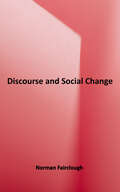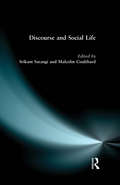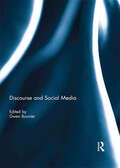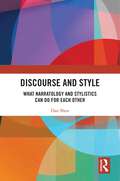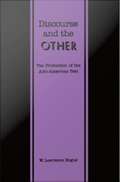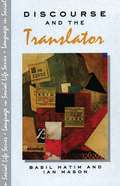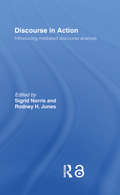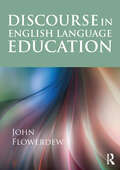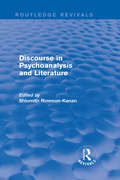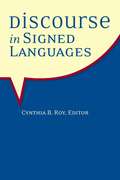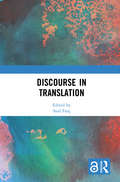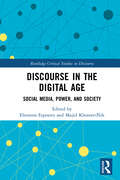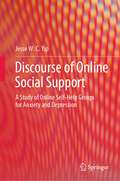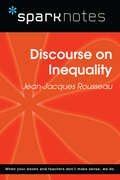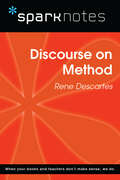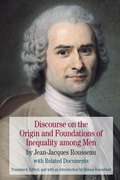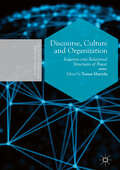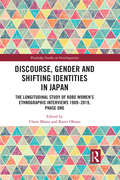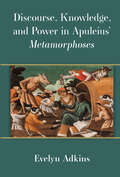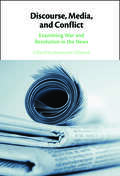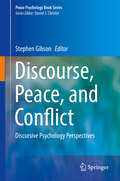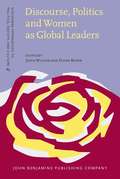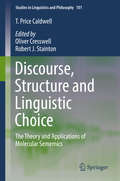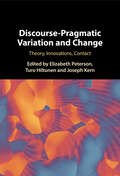- Table View
- List View
Discourse and Social Change
by Norman FaircloughThis book is a critical introduction to discourse analysis as it is practiced in a variety of different disciplines today, from linguistics and sociolinguistics to sociology and cultural studies. The author shows how concern with the analysis of discourse can be combined, in a systematic and fruitful way, with an interest in broader problems of social analysis and social change. Fairclough provides a concise and critical review of the methods and results of discourse analysis, discussing the descriptive work of linguists and conversation analysts as well as the more historically and theoretically oriented work of Michel Foucault. He develops an original framework for discourse analysis which firmly situates discourse in a broader context of social relations bringing together text analysis, the analysis of processes of text production and interpretation, and the social analysis of discourse events.
Discourse and Social Life
by Malcolm Coulthard Srikant SarangiThis collection brings together for the first time in a single volume many of the major figures in contemporary discourse studies. Each chapter is an original contribution which has been specifically commissioned for this book, and together they document the wide range of concerns and techniques which characterise the discipline at the turn of the century.Discourse and Social Life is concerned with a variety of different types of data - talk, text and interaction - and covers research sites which range from the home setting through the health care setting and the courtroom to the public sphere. The book not only provides a critical, historical overview of different traditions of discourse analysis, but also projects to some extent the possible developments of this field of study, as other allied disciplines (Philosophy, Psychology, Sociology, Rhetoric and Communication Studies) are taking a discursive turn. Readers are invited to draw parallels between these different approaches to studying discourse in its social context. The contributors are- Sally Candlin, Malcolm Coulthard, Justine Coupland, Nikolas Coupland, Norman Fairclough, Ruqaiya Hasan, Robert Kaplan, Geoff Leech, Yon Maley, Greg Myers, Celia Roberts, Srikant Sarangi, Ron Scollon, Theo van Leeuwen, Henry Widdowson and Ruth Wodak.
Discourse and Social Media
by Gwen BouvierDiscourse and Social Media is a unique and timely collection that breaks ground on how discourse scholars, coming from a range of disciplinary perspectives, can critically analyse different social media, including YouTube, Facebook, Twitter, and News. The book fills a gap in the market for a multi-disciplinary collection for analysing the discourse of social media. In providing a thorough review of the field to date, the opening chapter considers some of the common and divergent interests and priorities that exist in social media discourse analysis. It also discusses the wider methodological and theoretical implications which social media analysis brings to the process of discourse analysis, as new forms of connections and communication call us to re-think the static models that we have been using. The rest of the collection draws on different traditions in discourse studies, including Critical Discourse Analysis, Sociolinguistics, Pragmatics, Foucaultian analysis and Multimodality, to bring several unique approaches to critically analysing social media from a discourse perspective. Each ground-breaking chapter shows how different forms of social media data can best be selected, analysed, and dealt with critically. As a whole, Discourse and Social Media provides a go-to resource for social media scholars, as well as graduate students. The book is a significant contribution to the development of the field at this present shifting time. This book was originally published as a special issue of the Journal of Multicultural Discourses.
Discourse and Style: What Narratology and Stylistics Can Do for Each Other
by Dan ShenThis book examines overlaps, differences, and complementarities between narratology and stylistics, and shows the consequences of this examination for the practical analysis of prose narrative.Narratology identifies discourse as one of its two main objects of study (story being the other), and stylistics, of course, designates style as its concern. Too often, however, work in each of these fields proceeds without attention to developments in the other. This book corrects that situation by looking beneath the superficial similarities between the “discourse” of narratology and the “style” of fictional stylistics. The author shows that the two seemingly interchangeable terms actually refer to different textual elements. For example, both narratology and stylistics identify point of view as an important element of discourse and style, respectively, but each approach conceives of it differently and thus analyzes it differently. This book argues that the different analyses are complementary and shows how they can be brought together. This synthesis leads to richer conceptions of point of view as well as more comprehensive and precise analyses of its functions and effects in individual narratives.For its theoretical and interpretive contributions, this book will appeal to scholars and students in narrative studies, literary stylistics, and literary theory and criticism.
Discourse and the Other: The Production of the Afro-American Text
by W. Lawrence HogueThe central thesis of Lawrence Hogue's book is that criticism of Afro-American literature has left out of account the way in which ideological pressures dictate the canon. This fresh approach to the study of the social, ideological, and political dynamics of the Afro-American literary text in the twentieth century, based on the Foucauldian concept of literature as social institution, examines the universalization that power effects, how literary texts are appropriated to meet ideological concerns and needs, and the continued oppression of dissenting voices. Hogue presents an illuminating discussion of the publication and review history of "major" and neglected texts. He illustrates the acceptance of texts as exotica, as sociological documents, or as carriers of sufficient literary conventions to receive approbation. Although the sixties movement allowed the text to move to the periphery of the dominant ideology, providing some new myths about the Afro-American historical past, this marginal position was subsequently sabotaged, co-opted, or appropriated (Afros became a fad; presidents gave the soul handshake; the hip-talking black was dressing one style and talking another. ) This study includes extended discussion of four works; Ernest J. Gaines's The Autobiography of Miss Jane Pittman, Alice Walker's The Third Life of Grange Copeland, Albert Murray's Train Whistle Guitar, and Toni Morrison's Sula. Hogue assesses the informing worldviews of each and the extent and nature of their acceptance by the dominant American cultural apparatus.
Discourse and the Translator (Language In Social Life)
by B. Hatim Ian MasonDiscourse and the Translator both incorporates and moves beyond previous studies of translation. Its logical and informative approach to the problems of translation ensures that it will be essential for all those who work with languages 'in contact'. Incorporating research in sociolinguistics, discourse studies, pragmatics and semiotics, the authors analyse the process and product of translation in their social contexts. Through this analysis, the book emphasises the importance of the translator as a mediator between cultures.
Discourse in Action: Introducing Mediated Discourse Analysis
by Rodney H Jones Sigrid NorrisFrom emails relating to adoption over the Internet to discussions in the airline cockpit, the spoken or written texts we produce can have significant social consequences. The area of Mediated Discourse Analysis considers texts in their social and cultural contexts to explore the actions individuals take with texts - and the consequences of those actions. Discourse in Action: brings together leading scholars from around the world in the area of Mediated Discourse Analysis reveals ways in which its theory and methodology can be used in research into contemporary social situations explores real situations and draws on real data in each chapter shows how analysis of texts in their social contexts broadens our understanding of the real world.Taken together, the chapters provide a comprehensive overview to the field and present a range of current studies that address some of the most important questions facing students and researchers in linguistics, education, communication studies and other fields.
Discourse in English Language Education
by John FlowerdewDiscourse in English Language Education introduces students to the major concepts and questions in Discourse Studies and their applications to language education. Each chapter draws on key research to examine critically a particular approach in the field, providing a review of important literature, examples to illustrate the principal issues concerned and an outline of the implications for their application to pedagogy. Features include: coverage of a broad range of approaches in the field, including Systemic Functional Linguistics and Register, Speech Acts, the Cooperative Principle and Politeness, Conversation Analysis, Genre Analysis, Critical Discourse Analysis and Corpus Linguistics analysis of a wide range of discourse examples that include casual conversation, newspapers, fiction, radio, classrooms, blogs and real-life learner texts a selection of illustrations and tables carefully chosen to enhance students' understanding of different concepts and approaches stimulating discussion questions at the end of each chapter, specially designed to foster critical thinking, reflection and engagement with the topics covered. Engaging, accessible and comprehensive, Discourse in English Language Education richly demonstrates how Discourse Studies can inform the teaching of English and other languages, both as a foreign language and in the mother tongue. It will be essential reading for upper undergraduates and postgraduates with interests in Applied Linguistics, TESOL and Language Education.
Discourse in Psychoanalysis and Literature (Routledge Revivals)
by Shlomith Rimmon-KenanThe essays in this collection, first published in 1987, represent a collective attempt to listen with the third ear to the underhand ways the unspoken has of speaking, and to speak of these ways. By focusing on ‘discourse’ the volume is distinguished from traditional literature by its emphasis on rhetorical structures and textual strategies, and the investment of these structures with desire, power and other aspects of subjectivity, rather than the personality of the artist or the creative process. However, in this book the human dimension is not lost. By claiming that the structures in question are not merely linguistic, semiotic, or narratological (although they are all of these), the human dimension is returned- not ‘in the raw’, as in traditional approaches, but through the traces it leaves in the text, as activated by its reading. This book is ideal for students of literature and psychoanalytical theory.
Discourse in Signed Languages
by Cynthia B. RoyIn this volume, editor Cynthia B. Roy presents a stellar cast of cognitive linguists, sociolinguists, and discourse analysts to discover and demonstrate how sign language users make sense of what is going on within their social and cultural contexts in face-to-face interactions. In the first chapter, Paul Dudis presents an innovative perspective on depiction in discourse. Mary Thumann follows with her observations on constructed dialogue and constructed action. Jack Hoza delineates the discourse and politeness functions of hey and well in ASL as examples of discourse markers in the third chapter. Laurie Swabey investigates reference in ASL discourse in the fourth chapter. In Chapter 5, Christopher Stone offers insights on register related to genre in British Sign Language discourse, and Daniel Roush addresses in Chapter 6 the "conduit" metaphor in English and ASL. Jeffrey Davis completes this collection by mapping out the nature of discourse in Plains Indian Sign Language, a previously unstudied language. The major thread that ties together the work of these varying linguists is their common focus on the forms and functions of sign languages used by people in actual situations. They each provide new keys to answering how thoughts expressed in one setting with one term or one utterance may mean something totally different when expressed in a different setting with different participants and different purposes.
Discourse in Translation (Routledge Studies In Language And Identity Ser.)
by Said FaiqThis book explores the discourse in and of translation within and across cultures and languages. From the macro aspects of translation as an inter- cultural project to actual analysis of textual ingredients that contribute to translation and interpreting as discourse, the ten chapters represent different explorations of ‘global’ theories of discourse and translation. Offering interrogations of theories and practices within different sociocultural environments and traditions (Eastern and Western), Discourse in Translation considers a plethora of domains, including historiography, ethics, technical and legal discourse, subtitling, and the politics of media translation as representation. This is key reading for all those working on translation and discourse within translation studies and linguistics.
Discourse in the Digital Age: Social Media, Power, and Society (Routledge Critical Studies in Discourse)
by Eleonora Esposito Majid KhosraviNikThis collection makes the case for existing critical discourse analysis theory and methods to meaningfully engage with the communicative parameters, power dynamics, and technological affordances of contemporary digital spaces. This book lends a critical focus on discursive practices operating through the paradigm of social media communication, addressing the crucial interface of discourse and the participatory web with disciplinary rigour and a well-balanced focus. This volume features chapters highlighting a diverse range of methods, including multi-sited ethnography, multimodality, argumentation studies, and topic modelling, as applied to a global range of case studies to present a holistic portrait of the latest methodological and theoretical debates in this space. The collection demonstrates the many and pervasive impacts of digital mediation on established discursive practices that are (re-)shaping existing social values, practices, and demands. In so doing, the collection advocates for a new tradition in critical discourse research, one which is rigorous in accounting for both solid discursive frameworks and the evolving complexity of digital platforms, and which triangulates methodologies in order to fully make sense of contemporary discursive practices and power relations on the online–offline continuum. This collection will be of interest to students and scholars in critical discourse studies, digital communication, media studies, and anthropology.
Discourse of Online Social Support: A Study of Online Self-Help Groups for Anxiety and Depression
by Jesse W. YipThis book sheds light on the communication of social support, language use, and therapeutic effects in the context of online self-help groups for anxiety and depression. The book has two major purposes: the first is to enhance understanding of the phatic communication through a discourse-pragmatic perspective; and the second is to demonstrate the use of discourse analysis to discuss the potential therapeutic effects of the online self-help groups. Key concepts, including genre study, speech act theory, relational work and discourse analysis, are revisited and elucidated to show their applicability in health communication research. This book focuses on the topics of communication patterns, the communicative acts of self-disclosure and advice-giving, and relevant social theories in the communication of social support.This book is a useful reference guide for both undergraduate and postgraduate students who are interested in discourse analysis, pragmatics and health communication. It is also a valuable resource that catches attention of researchers who conduct interdisciplinary research pertaining to communication, clinical linguistics and social work.
Discourse on Inequality (SparkNotes Philosophy Guide)
by SparkNotesDiscourse on Inequality (SparkNotes Philosophy Guide) Making the reading experience fun! SparkNotes Philosophy Guides are one-stop guides to the great works of philosophy–masterpieces that stand at the foundations of Western thought. Inside each Philosophy Guide you&’ll find insightful overviews of great philosophical works of the Western world.
Discourse on Method (SparkNotes Philosophy Guide)
by SparkNotesDiscourse on Method (SparkNotes Philosophy Guide) Making the reading experience fun! SparkNotes Philosophy Guides are one-stop guides to the great works of philosophy–masterpieces that stand at the foundations of Western thought. Inside each Philosophy Guide you&’ll find insightful overviews of great philosophical works of the Western world.
Discourse on the Origin and Foundations of Inequality among Men: By Jean-Jacques Rousseau With Related Documents
by Jean-Jacques RousseauA provocative essay that challenged the superiority of civilized society and modern government, Jean-Jacques Rousseau's Discourse on the Origin and Foundations of Inequality made him an outcast among fellow Enlightenment thinkers but stands today as one of the most important political texts in Western history. <P><P>Helena Rosenblatt's new translation, introduction, and selection of related documents help students comprehend why Rousseau's criticisms of human nature, political hierarchy, and private property were so controversial in his time yet later were hailed as a foundation of democracy. <P><P>The introduction explores life experiences that shaped Rousseau's philosophy, explains contemporary ideas about political authority and social order, and guides students through Rousseau's thought, including explanations of how his work anticipated theories about evolution and inspired leaders of the French Revolution. <P><P>Related primary documents -- including a selection from Rousseau's Social Contract -- situate Rousseau's ideas in contemporary political and social thought. Questions for consideration, a chronology of Rousseau's life and work, and a selected bibliography enrich students' understanding of the man and his times.
Discourse, Culture and Organization: Inquiries Into Relational Structures Of Power (Postdisciplinary Studies in Discourse)
by Tomas MarttilaThis edited volume brings together leading international researchers from across the social sciences to examine the theoretical premises, methodological options and critical potentials of the Essex School of discourse analysis, founded on the work of Ernesto Laclau and Chantal Mouffe. In doing so, it presents a clear picture of a poststructuralist and post-foundational research program to postdisciplinary discourse research. Divided into three parts, it begins by elaborating the ontological, theoretical and methodological foundations of the Essex School’s approach to discourse analysis. The second part provides empirical case studies showing how the Essex School research program informs and instructs empirical discourse research. In the concluding third part authors explain how and with what possible consequences this strand of discourse research contributes to social practices of critique. It offers a crucial contribution to the further methodologization and operationalization of the Essex School’s approach so as to make it a viable alternative to discourse-analytical approaches that take dominant positions in today’s ‘field of discourse studies’. The book's transdisciplinary focus will attract readers who use discourse analysis in all areas of the social sciences and humanities, particularly applied linguistics, cultural anthropology, sociology, philosophy and history.
Discourse, Gender and Shifting Identities in Japan: The Longitudinal Study of Kobe Women’s Ethnographic Interviews 1989-2019, Phase One (Routledge Studies in Sociolinguistics)
by Claire Maree Kaori OkanoThis book is the first in a unique series drawn from an interdisciplinary, longitudinal project entitled ‘Thirty Years of Talk.’ For 30 years, Okano recorded ethnographic interviews and collected data on the language of working class women in Kobe, Japan. This long-range study sketches the transitions in these women's lives and how their language use, discourse and identities change in specific sociocultural contexts as they shift through different stages of their personal and public lives. It is a ground-breaking, ‘real time’ panel study that follows the same individuals and observes the same phenomena at regular intervals over three decades. In this volume the authors examine the changes in the speech of one particular woman, Kanako, as her social identity shifts from high-school girl to mother and fisherman’s wife, and as her relationship with the interviewer develops. They identify changes in linguistic strategies as she negotiates gender/sexuality norms, stylistic features related to the construction of rapport, the use of discourse markers as she gets older, and the interviewer’s information-seeking strategies.
Discourse, Knowledge, and Power in Apuleius’ Metamorphoses
by Evelyn AdkinsIn ancient Rome, where literacy was limited and speech was the main medium used to communicate status and identity face-to-face in daily life, an education in rhetoric was a valuable form of cultural capital and a key signifier of elite male identity. To lose the ability to speak would have caused one to be viewed as no longer elite, no longer a man, and perhaps even no longer human. We see such a fantasy horror story played out in the Metamorphoses or The Golden Ass, written by Roman North African author, orator, and philosopher Apuleius of Madauros—the only novel in Latin to survive in its entirety from antiquity. In the novel’s first-person narrative as well as its famous inset tales such as the Tale of Cupid and Psyche, the Metamorphoses is invested in questions of power and powerlessness, truth and knowledge, and communication and interpretation within the pluralistic but hierarchical world of the High Roman Empire (ca. 100–200 CE). Discourse, Knowledge, and Power presents a new approach to the Metamorphoses: it is the first in-depth investigation of the use of speech and discourse as tools of characterization in Apuleius’ novel. It argues that discourse, broadly defined to include speech, silence, written text, and nonverbal communication, is the primary tool for negotiating identity, status, and power in the Metamorphoses. Although it takes as its starting point the role of discourse in the characterization of literary figures, it contends that the process we see in the Metamorphoses reflects the real world of the second century CE Roman Empire. Previous scholarship on Apuleius’ novel has read it as either a literary puzzle or a source-text for social, philosophical, or religious history. In contrast, this book uses a framework of discourse analysis, an umbrella term for various methods of studying the social political functions of discourse, to bring Latin literary studies into dialogue with Roman rhetoric, social and cultural history, religion, and philosophy as well as approaches to language and power from the fields of sociology, linguistics, and linguistic anthropology. Discourse, Knowledge, and Power argues that a fictional account of a man who becomes an animal has much to tell us not only about ancient Roman society and culture, but also about the dynamics of human and gendered communication, the anxieties of the privileged, and their implications for swiftly shifting configurations of status and power whether in the second or twenty-first centuries.
Discourse, Media, and Conflict: Examining War and Resolution in the News
by Innocent ChiluwaBringing together contributions from a team of international scholars, this pioneering book applies theories and approaches from linguistics, such as discourse analysis and pragmatics, to analyse the media and online political discourses of both conflict and peace processes. By analysing case studies as globally diverse as Germany, the USA, Nigeria, Iraq, Korea and Libya, and across a range of genres such as TV news channels, online reporting and traditional newspapers, the chapters collectively show how news discourse can be powerful in mobilizing public support for war or violence, or for conflict resolution, through the linguistic representation of certain groups. It explores the consequences of this 'framing' effect, and shows how peace journalism can be achieved through a non-violent approach to reporting conflict. It will therefore serve as an essential resource for students, scholars and experts in media and communication studies, conflict and peace studies, international relations, linguistics and political science.
Discourse, Peace, and Conflict: Discursive Psychology Perspectives (Peace Psychology Book Series)
by Stephen GibsonThis first-of-its-kind volume brings discursive psychology and peace psychology together in a compelling practical synthesis. An array of internationally-recognised contributors examine multiple dimensions of discourse—official and casual, speech, rhetoric, and text—in creating and maintaining conflict and building mediation and reconciliation. Examples of strategies for dealing with longstanding conflicts (the Middle East), significant flashpoints (the Charlie Hebdo case), and current heated disputes (the refugee ‘crisis’ in Europe) demonstrate discursive methods in context as they bridge theory with real life. This diversity of subject matter is matched by the range of discursive approaches applied to peace psychology concepts, methods, and practice.Among the topics covered: Discursive approaches to violence against women.The American gun control debate: a discursive analysis.Constructing peace and violence in the Palestinian-Israeli conflict.Discursive psychological research on refugees. Citizenship, social injustice, and the quest for a critical social psychology of peace.The emotional and political power of images of suffering: discursive psychology and the study of visual rhetoric. Discourse, Peace, and Conflict offers expansive ideas to scholars and practitioners in peace psychology, as well as those in related areas such as social psychology, political psychology, and community psychology with an interest in issues pertaining to peace and conflict.
Discourse, Politics And Women As Global Leaders (Discourse Approaches To Politics, Society And Culture #63)
by John Wilson Diana BoxerDiscourse, Politics and Women as Global Leaders focuses on the discourse practices of women in global political leadership. It provides a series of discursive studies of women in positions of political leadership. 'Political leadership' is defined as achieving a senior position within a political organization and will often indicate a senior role in government or opposition. The volume draws on a diverse collection of studies from across the globe, reflecting a variety of cultures and distinct polities. The primary aim is to consider in what way(s) discursive practice underpins, reflects, or is appropriated in terms of women's political success and achievements within politics. The chapters employ differing theoretical approaches all bound by the discursive insights they provide, and in terms of their contribution to understanding the role of language and discourse in the construction of gendered identities within political contexts.
Discourse, Structure and Linguistic Choice: The Theory and Applications of Molecular Sememics (Studies in Linguistics and Philosophy #101)
by Robert J. Stainton T. Price Caldwell Oliver CresswellThis volume presents eight papers and a draft monograph by T. Price Caldwell on topics in linguistics, semiotics and philosophy of language. From the beginning of his professional career onwards, Caldwell wrote short fiction and poetry, and he taught English literature. The relevance to these of philosophy of language, semiotics and certain areas of linguistics increasingly caught his interest. This book presents the fruits of this later work. Of the papers included here, two are abstract and theoretical, focusing on linguistic methodology and Caldwell’s overarching views on the nature of meaning-in-context. His position here, which he called Molecular Sememics, echoes early Structuralism and Functionalism, but addresses shortfalls in each. Two other papers apply the method and theory to topics within semantics and pragmatics, including especially the structuring of discourse. The remaining four papers connect Caldwell’s theoretical insights to his life-long interests in fiction and pedagogy. The monograph – which Caldwell was left unfinished due to illness – aims to present as a single intellectual package the theory and the applications.
Discourse-Pragmatic Variation and Change in English
by Heike PichlerThis volume brings together key players in discourse variation research to offer original analyses of a wide range of discourse-pragmatic variables, such as 'like', 'innit', 'you get me', and 'at the end of the day'. The authors introduce a range of new methods specifically tailored to the study of discourse-pragmatic variation and change in synchronic and longitudinal dialect data, and provide new empirical and theoretical insights into discourse-pragmatic variation and change in contemporary varieties of English. The volume thus enhances our understanding of the complexities of discourse-pragmatic variation and change, and encourages new ways of thinking about variability in discourse-pragmatics. With its dual focus on presenting innovative methods as well as new results, the volume will provide an important resource for both newcomers and veterans alike in the field of discourse variation analysis, and spark discussions that will set new directions for future work in the field.
Discourse-Pragmatic Variation and Change: Theory, Innovations, Contact
by Elizabeth Peterson Turo Hiltunen Joseph KernDiscourse-pragmatic markers are central to everyday language, yet many aspects of their use and functions remain elusive or under-investigated. Bringing together a global team of leading scholars, this volume presents a representative showcase of work currently being conducted in the field of discourse-pragmatic variation and change, including investigations of features such as uh/um, please, sentence-final is all, and discourse-pragmatic features from a number of languages. The book emphasizes that not only have researchers answered the call to address complex issues such as cross-linguistic reliability, extending research across languages, and expanding and improving on methods and analysis, but that they continue to address perennial questions in the field of language variation and change. With sections on theoretical and methodological issues, innovative variables, and language contact situations, the volume offers a robust overview of best practices for both new and experienced researchers.
